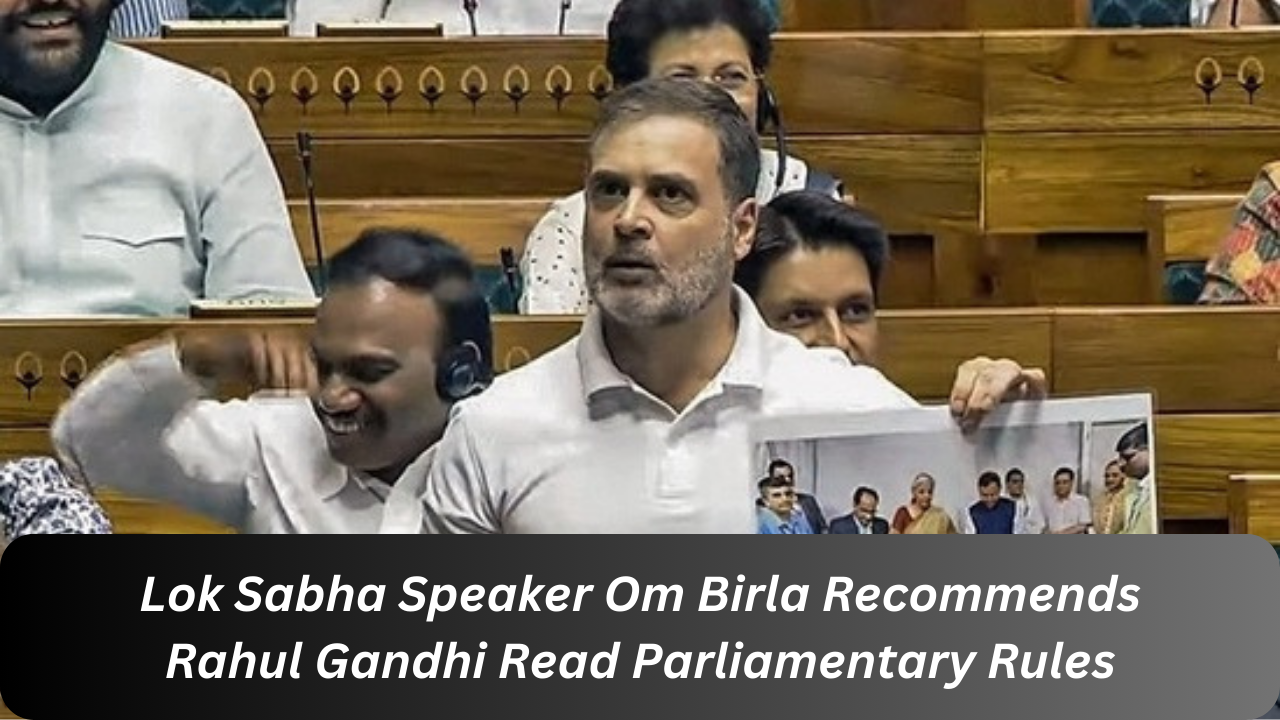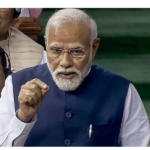In the realm of Indian politics, the interactions and dynamics within the Lok Sabha—the lower house of India’s Parliament—often make headlines, especially when they involve prominent political figures. A recent incident has drawn significant attention: Lok Sabha Speaker Om Birla’s recommendation to Rahul Gandhi, a key leader of the Indian National Congress (INC), to familiarize himself with parliamentary rules.
This recommendation, made during a Lok Sabha session, has sparked widespread discussion on parliamentary procedures, political decorum, and the roles of various stakeholders in India’s democratic process.
The Lok Sabha is a vibrant forum where debates, discussions, and decisions shape the future of the nation. With its rich history and complex rules of order, understanding the procedural framework is crucial for effective participation. The Speaker of the Lok Sabha, a position held by Om Birla since 2019, is responsible for maintaining decorum, ensuring that debates are conducted fairly, and upholding the rules of the house.
Rahul Gandhi, a prominent figure in Indian politics and a former President of the INC, has been an active participant in Lok Sabha sessions. His interventions, speeches, and criticisms often attract media attention and public scrutiny. However, his recent conduct during a session led Speaker Om Birla to advise him to better understand the parliamentary rules.
On [insert date], during a Lok Sabha session, Rahul Gandhi made a series of remarks and interventions that were perceived as contentious by some members and the Speaker. The session was marked by heated exchanges and discussions on [insert topic, e.g., economic policies, social issues, etc.]. During the proceedings, Speaker Om Birla interjected and advised Rahul Gandhi to review and adhere to the parliamentary rules.
The recommendation was made in response to what Speaker Birla considered deviations from standard parliamentary conduct. Specifically, the Speaker pointed out instances where Gandhi’s remarks or mannerisms might not have aligned with established procedures or decorum. This was not an isolated incident but part of a broader context where parliamentary rules play a vital role in ensuring smooth and respectful discourse.

Parliamentary rules in India are designed to regulate the conduct of members and the proceedings within the Lok Sabha. These rules cover various aspects, including:
- Order and Decorum: Members are expected to maintain decorum, avoid personal attacks, and adhere to respectful language during debates. The Speaker has the authority to call members to order if they deviate from these norms.
- Procedure for Interventions: There are specific procedures for making interventions, raising questions, and participating in debates. Members must follow these procedures to ensure that their contributions are recognized and addressed appropriately.
- Rules for Questions and Discussions: The rules outline how questions should be framed, how discussions should be conducted, and the time limits for speeches. These rules help manage the flow of business and ensure that all members have an opportunity to participate.
- Role of the Speaker: The Speaker acts as the presiding officer, responsible for maintaining order and ensuring that the rules are followed. The Speaker’s decisions on procedural matters are final and play a crucial role in the smooth functioning of the house.
Speaker Om Birla’s recommendation for Rahul Gandhi to read and understand parliamentary rules reflects his commitment to maintaining the integrity and effectiveness of the Lok Sabha. In his position, Birla is tasked with upholding the rules and ensuring that all members adhere to them.
During his remarks, Speaker Birla emphasized the importance of understanding the procedural framework. He stated:
“The Lok Sabha functions based on established rules and procedures. It is essential for every member to be well-versed in these rules to contribute effectively and maintain the decorum of the house.”
By advising Rahul Gandhi to review the rules, Speaker Birla was underscoring the need for all members to respect and adhere to the established procedures. This recommendation aligns with the Speaker’s role in ensuring that debates and discussions are conducted within the boundaries of parliamentary norms.
The recommendation made by Speaker Birla has elicited a range of reactions from various stakeholders, including politicians, media, and the public.
In response to the Speaker’s comments, Rahul Gandhi addressed the issue publicly, defending his conduct and expressing his commitment to contributing constructively to the parliamentary process. Gandhi acknowledged the importance of parliamentary rules but also emphasized the need for constructive dialogue and respectful debate. He stated:
“I respect the rules of the house and the role of the Speaker. My focus is on addressing the issues that matter to the people and contributing to meaningful discussions. I will review the rules and ensure that my contributions align with the house’s procedures.”
Gandhi’s response reflects his willingness to engage with the Speaker’s advice while maintaining his commitment to addressing key issues and contributing to parliamentary debates.
The recommendation has also drawn reactions from other politicians and parties. Some have supported Speaker Birla’s emphasis on adhering to parliamentary rules, while others have criticized the intervention as a distraction from substantive issues. For example:
- Supportive Voices: Some members of the BJP and other political figures have supported Speaker Birla’s stance, emphasizing the importance of maintaining order and following rules in parliamentary proceedings.
- Critics: Critics argue that the focus on procedural issues detracts from the substantive debates and the need for addressing pressing national concerns. They suggest that procedural criticisms should not overshadow the substance of parliamentary discussions.
The media coverage of the incident has been extensive, with various outlets analyzing the implications of Speaker Birla’s recommendation. Discussions have centered on:
- The Role of Procedure: The media has highlighted the importance of parliamentary procedures in ensuring effective governance and respectful discourse. The recommendation serves as a reminder of the need for all members to adhere to these procedures.
- Political Dynamics: The incident has also been viewed through the lens of political dynamics, with some commentators suggesting that the recommendation reflects broader tensions between different political factions.
Speaker Om Birla’s recommendation to Rahul Gandhi has broader implications for parliamentary conduct and political discourse in India.
The emphasis on understanding and following parliamentary rules is crucial for maintaining decorum and ensuring effective debates. By reinforcing the importance of these rules, Speaker Birla aims to foster a respectful and productive environment within the Lok Sabha.
The Speaker’s role in upholding parliamentary procedures is vital for the smooth functioning of the house. Speaker Birla’s recommendation underscores the responsibility of the Speaker to ensure that all members adhere to the rules and contribute constructively to parliamentary proceedings.
The incident highlights the ongoing need for political leaders to engage with the parliamentary process in a manner that respects established norms. It serves as a reminder for all members to be mindful of procedural rules and contribute to discussions in a way that aligns with the house’s expectations.

Speaker Om Birla’s recommendation for Rahul Gandhi to read and understand parliamentary rules has sparked significant discussion and reflection on the nature of parliamentary conduct and political discourse. The emphasis on adhering to procedural norms underscores the importance of maintaining order and ensuring that debates are conducted respectfully and effectively.
As India’s democratic institutions continue to evolve, the role of parliamentary procedures in shaping political engagement remains crucial. The incident serves as a reminder of the need for all members to engage with the parliamentary process in a manner that upholds the integrity of the house and contributes to meaningful discussions on key national issues.
In the coming days, it will be important to observe how this recommendation influences the dynamics within the Lok Sabha and whether it leads to more constructive and respectful parliamentary engagements. The ongoing dialogue around this issue will likely shape the future of political discourse and parliamentary conduct in India, highlighting the need for adherence to rules while addressing the pressing issues facing the nation.
This article provides a detailed overview of the incident involving Speaker Om Birla and Rahul Gandhi, exploring the context, reactions, and broader implications of the recommendation.











